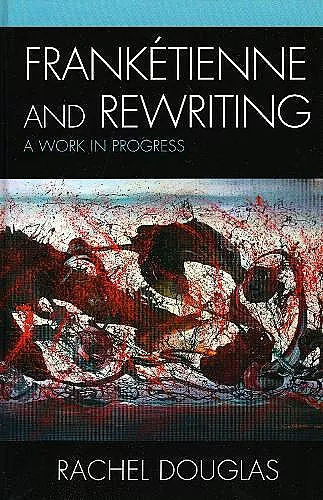Frankétienne and Rewriting
A Work in Progress
Format:Hardback
Publisher:Lexington Books
Published:16th May '09
Currently unavailable, and unfortunately no date known when it will be back

"Rewriting" in the context of critical work on Caribbean literature has tended to be used to discuss revisionism from a variety of postcolonial perspectives, such as "rewriting history" or "rewriting canonical texts." By shifting the focus to how Caribbean writers return to their own works in order to rework them, this book offers theoretical considerations to postcolonial studies on "literariness" in relation to the near-obsessive degree of rewriting to which Caribbean writers have subjected their own literary texts. Focusing specifically on Frankétienne, this book offers an overview of how the defining aesthetic and thematic components of Frankétienne's major works have emerged over the course of his forty-year writing career. It reveals the marked development of key notions guiding his literary creation since the 1960s, and demonstrates that rewriting illustrates the central aesthetic of the Spiral which has always shaped his œuvre. It is, the book argues, the constantly moving form of the Spiral which Frankétienne explores through his constant reworking of his previously written texts. Frankétienne and Rewriting negotiates between the literary and material ends of the burgeoning field of postcolonial studies, arguing that literary characteristics in Frankétienne connect with changing political, social, economic, and cultural circumstances in the Haiti he rewrites.
Rachel Douglas' timely study offers remarkably insightful close readings of a writer who has for too long remained unknown to all but a few specialists. Moving decisively beyond earlier models of genetic criticism, Douglas' striking proposition is to analyze 'rewriting' as a primary dimension of Frankétienne's literary productivity. Under Douglas' thoughtful gaze, Spiralism stands revealed as a literature in perpetual movement and self-refashioning, one of outrageous invention and exuberant expressivity that alone has the imaginative resources to articulate the unfathomable terror and beauty of Haitian modernity. -- Nick Nesbitt, Senior Lecturer in French, School of Language and Literature at the University of Aberdeen
An assured and lively study of a neglected writer. Douglas breaks new ground in her analysis of the role of rewriting in Frankétienne’s work; her book marks an important contribution to francophone postcolonial studies, and will be of significant interest to scholars of Caribbean literature in the broadest sense. -- Maeve McCusker, Senior Lecturer in French Studies and Chair of the Postcolonial Research Forum at Queens University Belfast
Douglas’s study becomes a meticulous reading of various editions of Franketienne’s works in order to illustrate the ‘principal dynamics of a spiralist literary aesthetic.’ * Research in African Literatures *
In Frankétienne and Rewriting Rachel Douglas presents an elegant overview of Haitian spiralist writer Frankétienne’s literary praxis….In each of these chapters Douglas is faced with the challenge of establishing critical order while respecting the deliberate chaos of Frankétienne’s aesthetic. Her manner of engaging with the spiralic nature of both the individual works and the whole of Frankétienne’s corpus is commendable. In her Conclusion, Douglas very generously suggests myriad directions for future study that might build on her work, moving beyond analysis of Frankétienne’s corpus to explorations of the specific practices of other Caribbean rewriters. * Project Muse *
Rachel Douglas’s book makes an excellent contribution to this still-nascent body of critical work. Taking the practice of rewriting as a marker of Frankétienne’s infinitive inventiveness and of the changing contexts in which he writes, Douglas argues very persuasively that the author’s work should not be read as static entity, but as a fluid, ever-evolving phenomenon…. Douglas excels particularly in relating textual analysis to the social and political contexts of writing…. This well written, assured and perceptive study will be an important point of reference for future research on Frankétienne, and should also serve to encourage the incorporation of his searching, complex, yet curiously lucid work into Francophone, Caribbean, and postcolonial reading lists. * Modern and Contemporary France *
Few contemporary authors have produced such a challenging – and fascinating – literary oeuvre as Haitian author Frankétienne, and Rachel Douglas’ magisterial study is an invaluable source for anyone with an interest in Caribbean culture in general and Frankétienne in particular. Douglas approaches Frankétienne’s corpus through the prism of rewriting, and convincingly argues that the act of rewriting proves invaluable to tracing the evolutions in the author’s work at different moments in his personal, aesthetic and political trajectory…. The study skilfully interweaves theoretical insights with a series of nuanced close readings of Frankétienne’s texts, which succeed in conveying the excitement of this prolific author’s work…. Beyond the book’s evident appeal to Francophone and postcolonial literary and cultural specialists wishing to deepen their knowledge of the work of Frankétienne, it will undoubtedly also be of interest to researchers working on book history, reception studies and translation studies. * International Journal Of Francophone Studies *
In Franke´tienne and Rewriting Rachel Douglas presents an elegant overview of Haitian Spiralist writer Franke´tienne’s literary praxis, connecting the author’s near-obsessive revising to broader postcolonial Caribbean literary phenomena. Douglas’s study offers a comparative analysis of five major works, emphasizing the ethical and the aesthetic perspectives. * Oxford Journals *
In Franke´tienne and Rewriting Rachel Douglas presents an elegant overview of Haitian Spiralist writer Franke’tienne’s literary praxis, connecting the author’s ‘near-obsessive’ (p. 1) revising to broader postcolonial Caribbean literary phenomena Douglas rightly insists on the importance of fully contextualizing the works in question, considering them always with respect to the changing historical, socio-economic, and cultural realities of twentieth-century Haiti. In each of these chapters Douglas is faced with the challenge of establishing critical order while respecting the deliberate chaos of Franke’tienne’s aesthetic. Her manner of engaging with the spiralic nature of both the individual works and the whole of Franke’tienne’s corpus is commendable. In her Conclusion, Douglas very generously suggests myriad directions for future study that might build on her work, moving beyond analysis of Franke’tienne’s corpus to explorations of the specific practices of other Caribbean rewriters * Project Muse *
ISBN: 9780739125656
Dimensions: 240mm x 161mm x 18mm
Weight: 460g
206 pages